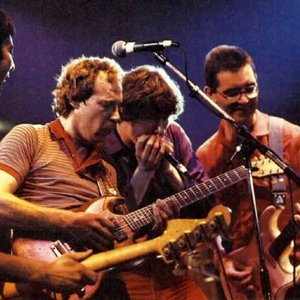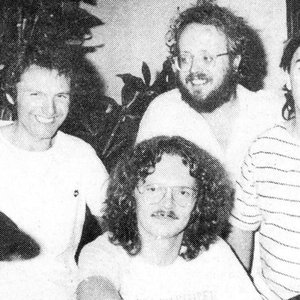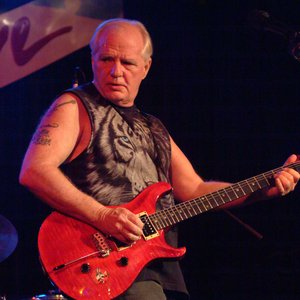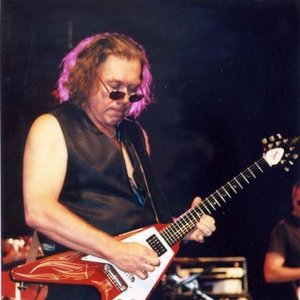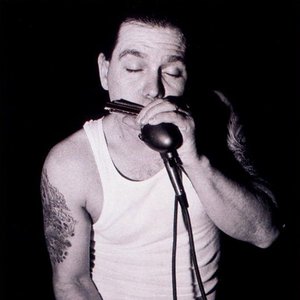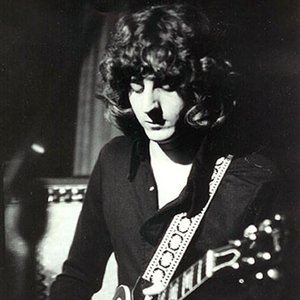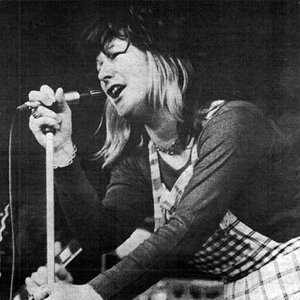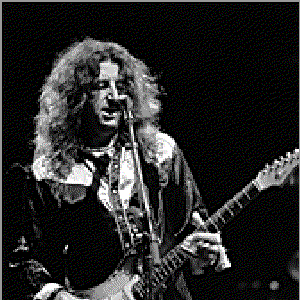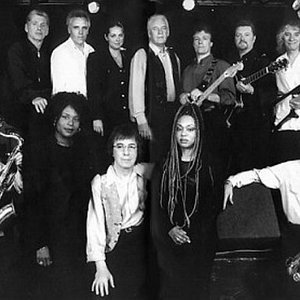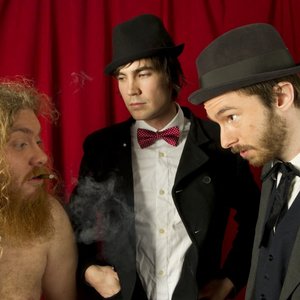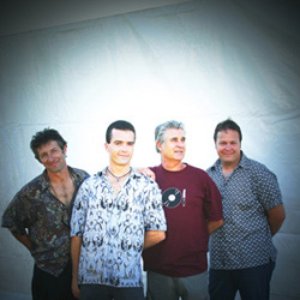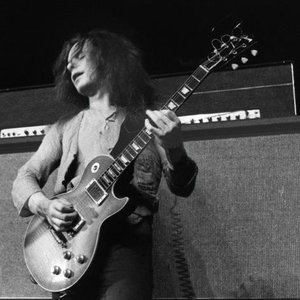Biography
There is more than one artist using this name.
1)Melbourne Four Piece Punk Band.
-www.myspace.com/wolfmanjackband -
2)Robert Weston (Bob) Smith (January 21, 1938 – July 1, 1995) became world famous in the 1960s and 1970s as a disc jockey using the stage name of Wolfman Jack.
Born in Brooklyn, Bob Smith was a fan of disc jockey Alan Freed who helped to turn African-American rhythm and blues into Caucasian rock and roll music. Freed originally called himself the Moondog after New York City street musician Moondog. Freed both adopted this name and used a recorded howl to give his early broadcasts a unique character. Bob Smith's adaptation of the Moondog theme was to call himself Wolfman Jack and add his own sound effects. The character was based in part on the manner and style of bluesman Howling Wolf.
Once Bob Smith found fame he kept the name Wolfman Jack and attempted to mask his true identity to create public interest in his radio character. The hip, sexually suggestive Wolfman Jack persona allowed Smith to ignore the prevailing racial segregation of American radio.
According to former disc jockey Don Logan, Bob Smith's career began on KCIJ-AM, a daytime station in Shreveport, Louisiana. In Shreveport, Gordon McLendon owned KEEL-AM as a part of his very successful group of stations which was challenged by a KREB-AM, a new station formed by Larry Brandon from the defunct KENT-AM. A radio "war" for the same listeners took place, in which Brandon ultimately lost and KREB also went off the air. Other sources, including the Radio Hall of Fame and Wolfman Jack's autobiography (Have Mercy!) state that he started his career as Daddy Jules at WYOU-AM in Newport News, Va. in 1960.
Larry Brandon then made a deal with attorney Arturo Gonzalez in Del Rio, Texas, who operated the Inter-American Radio Advertising, Inc. sales agency for XERF from his law office on Pecan Street. XERF was one of the Mexican border blasters that transmitted with power far in excess of the licensed commercial radio stations in the United States which were limited to 50 kW on AM. XERF had a 500 kW RCA transmitter that broadcast on a clear channel from Ciudad Acuña, Coahuila, just across the Rio Grande from Del Rio.
Larry Brandon bought all of the available night time hours and with Don Logan, Buddy Blake and Bob Smith began making prerecorded radio shows on 10 inch, one hour tapes which were then mailed by Brandon from Shreveport to Gonzelez in Del Rio who had them delivered to Ciudad Acuña for airplay. According to Logan these programs replaced the preachers and went out from 6pm to 6am, but Logan also says that only six hours of programming was recorded per day and leaves the impression that the tapes were repeated.
Brandon's programming on XERF reached Shreveport which according to Logan presented a conflict of interest for the people who were making them. However, it was on these taped programs that Bob Smith began to morph into Wolfman Jack in order to conceal his real identity from the XERF listeners and from his daytime employers at KCIJ-AM in Shreveport. Logan says that when Smith began to create his gravely voiced character of Wolfman Jack to which he added a howl, he told Bob Smith:
"That howl of yours would wake a dead man and that dead man might be Hank Williams and he, sure as hell, doesn't want you 'Howling at the Moon'."
Again according to Logan, the taping came to an end when Brandon began offering XERF listeners an autographed picture of Jesus. It was then that Bob Smith took off from Shreveport to visit Arturo Gonzalez at his law office on Pecan Street in Del Rio. It was Gonzalez who sent him across the U.S.-Mexico border each day to do live programs from the studio of XERF at Ciudad Acuña for Inter-American Radio Advertising, Inc., which Gonzalez operated from his law office.
Wolfman Jack's program was broadcast to much of the United States, into Canada and via AFN Europe from 9 to 10 p.m.. He played whatever music he liked, regardless of the performer's ethnicity. Any night a listener might hear a mix of blues music, rockabilly, doo-wop, zydeco, rock and roll, jump blues, rhythm and blues or jazz.
He frequently punctuated his broadcasts with howls, which, along with his gravelly voice, made him instantly recognizable. His style was borrowed from both Alan Freed and bluesman Howlin' Wolf. Many listeners assumed that Bob Smith was African American, though in fact he was of European descent.
His career from 1962 to 1964 in Ciudad Acuña was not without incident because he twice found himself involved in gun play during which victims died. Due to the lawlessness of the area, Bob Smith, after a brief detour to a Minneapolis station, took himself and his character of Wolfman Jack towards the West Coast and XERB, another border blaster that could reach Los Angeles, California.
In 1973 Wolfman Jack was brought into WNBC in New York, to engage in a high-profile ratings battle with WABC Top 40 legend "Cousin Brucie" Bruce Morrow. In this the Wolfman failed to gain much traction.
For the last two years of his life, Wolfman Jack did a live weekly show from WXTR-FM in Washington, DC. The show was nationally syndicated by Liberty Broadcasting. The first year of the show was live at the Hard Rock Cafe, and the second season from Planet Hollywood. Wolf's manager and friend Lonnie Napier directed every show. Wes Johnson wrote and performed live comedy bits with the Wolfman, and Marilyn Thompson contributed news and gossip. Wolfman Jack performed his last live show at Planet Hollywood on June 30, 1995, just ten hours before his death.
In the early days, Wolfman Jack made sporadic public appearances, usually as an MC for rock bands at local LA clubs. At each appearance he looked a little different because Bob Smith hadn't decided on what "The Wolfman" should look like. Early pictures show him with a goatee however sometimes he combed his straight hair forward and added dark makeup to look somewhat "ethnic." Other times he had a big afro wig and large sunglasses covering his eyes. It wasn't until he appeared in the 1969 film, "The Committee," (A montage of skits by the seminal comedy troupe The Committee) that mainstream America got a good look at Wolfman Jack. Four years later he appeared in director, George Lucas' second feature film, American Graffiti as himself. His broadcasts tie the film together and a main character catches a glimpse of the mysterious Wolfman in a pivotal scene. Lucas also gave the Wolfman a fraction of a "point," the divination of the profits from a film, in gratitude for participating in the seminal project and these proceeds finally allowed the deejay a regular income for life.
Subsequently, Bob Smith appeared in several films and television shows as Wolfman Jack. They included The Midnight Special; The Wolfman Jack Show, The Odd Couple, What's Happening,Vega$, Hollywood Squares, Married… with Children, and Galactica 1980 in which he interacts with a Cylon Centurion.
He also appeared in a commercial for Clearasil.
He also furnished his voice in the 1974 Guess Who's tribute, the top 40 hit single, "Clap for the Wolfman." A few years earlier, Todd Rundgren recorded a similar tribute, "Wolfman Jack," on the album Something/Anything?.
In July 1974 Wolfman Jack was the MC for the Ozark Music Festival, a three-day event at the Missouri State Fairgrounds, in Sedalia, Missouri. This was a huge Rock Festival and some estimates place the crowd count at 350,000 people which would make this one of the largest music events (Rock Festivals) in history.
When the one surviving ship in what had originally been a pirate radio network of Radio Caroline North and Radio Caroline South sank in 1980, a search began to find a replacement. Due to the laws passed in the UK in 1967, it became necessary for the sales operation to be situated in the USA. For a time the manager of Wolfman Jack acted as the West Coast agent for the planned new Radio Caroline.
As a part of this process Wolfman Jack was set to deliver the morning shows on the new station. To that end Wolfman Jack did record a number of programs which were never aired due to the failure of the station to come on air according to schedule. (It eventually returned from a new ship in 1983 which remained at sea until 1990.) Today those tapes are traded among collectors of his work.
Wolfman Jack died of a heart attack in Belvedere, North Carolina, on July 1, 1995, at only 56 years of age. The day before his death, he had finished broadcasting his last live radio program, a weekly program nationally syndicated from Planet Hollywood in downtown Washington, D.C. Wolfman Jack said that night "I can't wait to get home and give Lou a hug, I haven't missed her this much in years." Wolfman had been on the road, promoting his new autobiography Have Mercy!. Lou Lamb Smith, Wolfman's wife did get that hug. She met Wolfman at the door of their home as he arrived from the airport. He opened his arms wide, smiled and said "One more time." As Lou went to hug him, Wolfman collapsed in her arms, and died. His business, Wolfman Jack Productions, is still listed in the local phone book.
A memorial was dedicated to his memory at Del Rio, Texas, where he first began his career as Wolfman Jack.
Wolfman Jack was inducted into the Radio Hall of Fame in 1996.
Beginning in 2006, a 1960s-themed channel, XM 60's on 6, on XM Satellite Radio began airing a regular program utilizing airchecks from Wolfman Jack's older syndicated shows. The XM show currently airs one hour per week at 11 PM US Eastern Time and five hours on Sunday night at 7 PM US Eastern Time.
In addition, Wolfman Jack's widow, Lou Lamb Smith, has released a one- to two-hour syndicated program built from what were thought to be "lost" archives and airchecks of his shows. The airchecks used in the shows date from the 1960s all the way up to his death in the 1990s. About a dozen oldies-oriented stations in the United States and Canada have picked up the show, and air times for the show vary by station.
Both varieties of the show airing today are available for free on the Internet.
Mad Dog, a DJ in the 2005 Activision PC Videogame the Movies is based on Wolfman Jack.
3) A blues and blues-rock band from Umeå in Sweden. http://www.myspace.com/wolfmanjacksweden
Artist descriptions on Last.fm are editable by everyone. Feel free to contribute!
All user-contributed text on this page is available under the Creative Commons Attribution-ShareAlike License; additional terms may apply.

